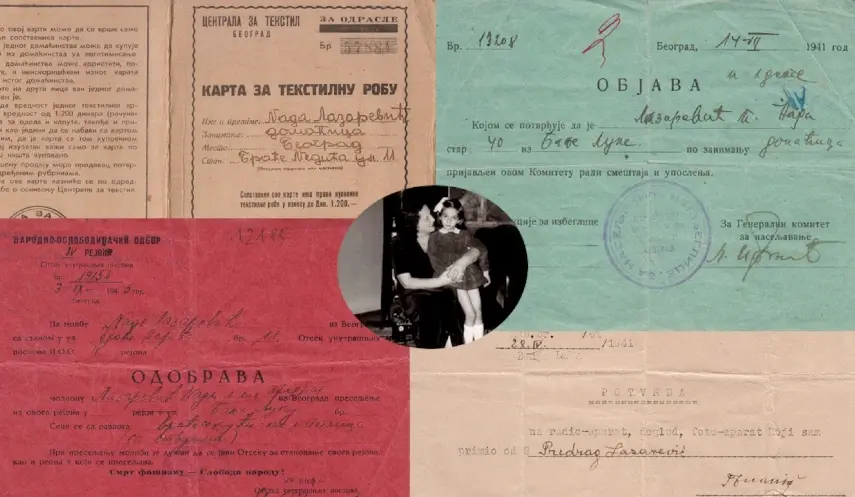THE NOTORIOUS NDH - LIKE DELUSION AND BAD DREAM
Republika Srpska - Banja Luka - sights /5/
06/06/2025
10:00

BANJA LUKA, JUNE 6 /SRNA/ - Almost like a delusion and a bad dream, April 1941 dawned and the infamous Independent State of Croatia /NDH/ emerged.
Emotion, history, longing for a beautiful dream and a premonition of the coming sea were put in this short, clear and sharp sentence by Nadežda Lazarević-Kovačević, the only granddaughter of the Vrbas ban.
The splendor, smiles, but also the other everyday life of the residence of the Ban of the Vrbas Banate was replaced by the fate of war - World War II.
The German command settled in the Banski Dvor /the Ban's Palace/, the luxurious hall was converted into a grain warehouse, and contemporaries of the time say that it also served as a stable for a time.
The Germans deported the most representative pieces of furniture, including the luxurious and expensive Louis XIV set, and since then, all trace of them has been lost.
Some of the furniture has been preserved, such as a sideboard and chest of drawers from the official dining room on the first floor, as well as a desk from the Ban's apartment, which are now in the office of the director of the Banski Dvor, and a monumental table from the "blue salon".
At that time, the banker Nada Lazarević's knowledge of German language was helpful when it comes to the fate of Lazarevićs. She had good relations with the German officers who moved into the ground floor of the Lazarević family house. However, it soon became clear to her that, faced with the Ustasha terror, she and her mother and son needed to leave Banja Luka as soon as possible. They received passes to go to Serbia.
"Along with the family of one priest, she received a railway carriage and placed some things in it, a salon set decorated with mother-of-pearl inlays, which her grandfather Miloš Dobraš bought, an icon of the Most Holy Theotokos with Christ that she inherited from her grandmother, and there was also an icon of Saint Basil the Great, Lazarević’s patron saint, as well as a portrait of her only child, some tableware and clothes, randomly collected photographs, Tošo's top hat, some of his personal belongings, but also a few of his favorite evening dresses," said Lazarević-Kovačević.
Whether she lived in good times or bad, Nada Lazarević always devoted a lot of time to raising her son. Although she adored him and indulged his little childhood whims, she raised him quite strictly.
She insisted on good manners and appropriate behavior, but was also relentless when it came to studying. Predrag Gugo Lazarević described their relationship this way:
"But my mother made me a man because she was very resolute towards me, even though she had tied my whole life to me. She didn't even allow me to stop my education in Belgrade when we escaped in 1941, even though the Germans announced that if an incident happened and any of the Germans were killed, we would meet the fate of the pupils in Kragujevac. The parents had to sign that. She signed it and agreed to let me continue my education, so whatever happens to other Serbian children will happen to me too."
And just as good times have their end, so do bad times. In May 1945, the war ended. Some Banja Luka residents stayed in Belgrade, and some returned, as Nada did with her son and mother.
Personal tragedies followed, but she coped with them, and contemporaries say that she endured the provocations of the new regime with incredible calm. She remained silent, lived a secluded life, until fifteen years after the war, when she took in her arms her newborn granddaughter, Nadežda, who became the center of her world.
"My grandmother and I had our own ritual. Each January 1, while the New Year's Concert from Vienna is being broadcast, I parade to the rhythm of waltzes, polkas and marches in gorgeous evening dresses, which my mother initially narrowed with safety pins, while my grandmother remembers the king's wedding and Queen Mary's eyes - `blue and unforgettable`. And so, the years passed, instead of Willibald `Willi` Boskovsky, the endlessly charming Lorin Maazel stood in front of the Vienna Philharmonic, I no longer needed safety pins, and then in the summer of 1980, my grandmother left this life, quietly, unobtrusively, in the ladylike way that only she could," said Lazarević-Kovačević, who to this day never misses the Vienna New Year's Concert. /to be continued/

DODIK: MOVE TOWARD GOAL WITHOUT HESITATION – SRPSKA MUST RESOLVE ITS STATUS

DODIK: ELECTIONS WILL BE BOYCOTTED, THIS IS NOT REBELLION BUT POLITICAL RESPONSE

DODIK: I WILL REQUEST MOSCOW’S SUPPORT FOR SRPSKA INDEPENDENCE REFERENDUM



